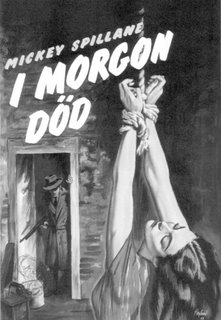
At long last... I must be the last one in the whole internet who starts writing about Mickey Spillane after his recent death.
First, let me put it this way: I don't really like Spillane's books and I strongly oppose everything his hero, Mike Hammer, stands for. But, second, let me also say that I admit to a certain fascination for the bruteness of Spillane's books. (And, thirdly, this makes me cringe a bit.)
I agree with Julian Symons who says in his Bloody Murder! that the most worrisome thing about Spillane is that Mike Hammer is a hero. He can easily wound or even kill someone with his gun or fists while interrogating a suspect (and he sure won't need any credentials from a judge or some such). I don't mind, say, Richard Stark's Parker killing off several people in a book, but Parker's not a hero. He's not doing what's right and no one is saying he does. Also Hammett's Op killing dozens of villains in Red Harvest is nothing to me: he's just a man doing his work. He's not to be admired.
Spillane's Hammer, on the other hand, is revenging wrong deeds done to him. If he's revenging the killing of a girl, it's because the girl liked him and he liked the girl. It's not for the girl, it's for him. To put it more academically, the killing is the only way for a man like Hammer to show his manliness, to retain his male identity. The crisis of masculinity after the WWII has been discussed almost to death, but given the evidence in Spillane's novels, there's no denying that masculinity was indeed in a crisis in the late fourties and early fifties.
Spillane was criticized severely throughout his career, but it seems that the clock is turning backwards and now he has even his civilized defenders. Someone said a while back at the Rara-Avis e-mail list that the myth of avenging angel lives in Mike Hammer and therefore Spillane's novels rise close to the truth, elevating close to art. I say that people should be able to oppose myths that are potentially dangerous.
Maybe it's the Finnish welfare state in me talking and I don't really understand the conditions of life in the US. It's also my leftist education, you might say.
But I also find Spillane a sloppy writer and weak plotter. He seems to have composed his plots of scenes in which Hammer is either shooting out with the bad guys or he is being tortured or preaching about how he's right. This makes some of his novels pretty boring, especially Kiss Me Deadly (which, admittedly, I've read only in a Finnish translation which may be bad or abridged or both). To me, it seems, there's nothing between those scenes of violence and action, while I'd really appreciate some insight into a character and milieu.
Well, some people say that Spillane was good at setting a tone. Well, um, yeah. What the guy had was an ear for good opening and ending lines:
The little guy's face was a bloody mess. (The Twisted Thing, 1966)
You walk down the street at night. It's raining out. (The Snake, 1964)
The "It was easy" sequence from I, the Jury (1947) is also noted. (My dad, who's been more leftist than I am now, said that it's a great scene. Who am I to contradict my father?)
What Spillane also had was influence. In the entry for Spillane in my Pulpografia I cite Max Allan Collins, Andrew Vachss and Frank Miller as authors who show Spillane's influence. What I left out - or maybe didn't even understand - that Spillane was one of the most influential crime writers ever. There wouldn't be Dirty Harry without Spillane, someone said a while back (and I really like the first Dirty Harry film). And without Dirty Harry, well, you know - dozens and dozens of films would've been left unmade. Same goes for books: whole genres could be wiped out were it not for Spillane. (Someone might say that the world would be a better place without, say, the executioner genre of the seventies.)
But influence doesn't make someone a great artist or author. But, well, Spillane himself said he's no artist or author, he's just a writer and writes what sells. Maybe he knew too well his own limits. But then a question comes to me: was he serious about his stuff? There are scenes in which Spillane comes close to self-parody. Is this what he really meant?
Richard Telfair offered a great parody of Spillane and Mike Hammer in his Monty Nash novels. Monty Nash says things like: "It takes a lot of man to kill a dame. I'm a lot of man." There's also no masculine anxiety in the Monty Nash books, which makes me more interested in them than Spillane. Maybe that's what it is: since I don't feel any anxiety about my own malehood (sorry for boasting!), I don't feel getting interested in Spillane's and Hammer's male anxiety.
Case closed? (The cover scan on top is a Swedish edition from the late fifties, with an illustration by Bertil Hegland. Sorry, it's only in b&w. An illo from a Finnish pulp can be found here. Finnish paperbacks, with lots of Spillane, here.)
1 comment:
I agree with you on the whole. Spillane is a sloppy writer, especially in the Hammerbooks(and of course in the stupid Tiger Mann adventures which Spillane most surely wrote just for money), but the interesting parts in early Hammer are the passages of justified raw violence. When I read them I almost get the taste of blood in my mouth - something which never happens with any other old crime/pulp stories. Good or bad? Well, Spillane moves me. The subjective viewpoint is thrilling.
/Tommy
Post a Comment